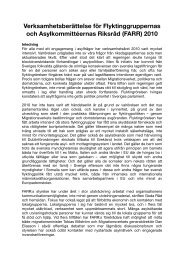FamiljeÃ¥terförening utan dokument â Svensk politik och ... - FARR
FamiljeÃ¥terförening utan dokument â Svensk politik och ... - FARR
FamiljeÃ¥terförening utan dokument â Svensk politik och ... - FARR
You also want an ePaper? Increase the reach of your titles
YUMPU automatically turns print PDFs into web optimized ePapers that Google loves.
Beslut om prövning, Jamal <strong>och</strong> Nassma Adnane mot Nederländerna, 6 November 200149. The Court has indeed previously rejected cases involving failed applications for family reunion and complaintsunder Article 8 where the children concerned had in the meantime reached an age where they were presumablynot as much in need of care as young children and increasingly able to fend for themselves. In cases of this nature,the Court has also examined whether the children had grown up in the cultural and linguistic environment oftheir country of origin, whether they had other relatives there, and whether it could be expected of the parentsto return to that country (see, for instance, Benamar v. the Netherlands (dec.), no. 43786/04, 5 April 2005; I.M.v. the Netherlands (dec.), no. 41266/98, 25 March 2003; and Chandra and Others v. the Netherlands (dec.), no.53102/99, 13 May 2003).50. In the present case the Court notes that the applicants have not alleged that Mehret, who undoubtedly hasstrong cultural and linguistic links with Eritrea, could no longer be looked after by the relatives who have beendoing so ever since her mother left. They have, nevertheless, argued that Mehret’s age – rather than making herless dependent on her mother – made it even more pertinent for her to be allowed to join her family in theNetherlands. This was because, in accordance with Eritrean custom, Mehret’s grandmother had taken her out ofschool, and Mehret had also reached an age where she could be married off (see paragraph 13 above). AlthoughMrs Tuquabo-Tekle disagreed with the choices made for Mehret, she was unable to do anything about them as longas her daughter was living in Eritrea. The Court agrees with the Government that the applicants’ arguments in thiscontext do not, by themselves, warrant the conclusion that the State is under a positive obligation to allow Mehretto reside in the Netherlands. Even so – and bearing in mind that she was, after all, still a minor – the Court acceptsin the particular circumstances of the present case that Mehret’s age at the time the application for family reunionwas lodged is not an element which should lead it to assess the case differently from that of Şen.51. The Court would, moreover, add that, although not in itself decisive, it is noteworthy that when Mrs Tuquabo-Tekle successfully sought leave from the Norwegian authorities to be reunited with her daughter in Norway, Mehretwas much the same age as Sinem Şen was when her parents lodged such an application with the Netherlandsauthorities (see paragraph 9 above).52. Having regard to the above, the Court finds that the respondent State has failed to strike a fair balance betweenthe applicants’ interests on the one hand and its own interest in controlling immigration on the other.Accordingly, there has been a violation of Article 8 of the Convention.Tuquabo-Tekle m.fl. mot Nederländerna, dom 1 dec. 2005.3.3 EUs gränskodexEus gränskodex, en förordning som alltså gäller som lag i Svergige, har använts som argument av Migrationsverket<strong>och</strong> i någon mån Migrationsöverdomstolen för varför det ska finnas krav på styrkt identitet. Kodexen innehållerinstruktioner för vad som ska ske när någon passerar in i EU genom de yttre gränserna. Bland annat skaresehandlingar <strong>och</strong> personens identitet kontrolleras. Det finns flera anledningar till varför gränskodexen inteär något bra skäl till att kräva styrkt identitet vid familjeåterförening. Till att börja med är Europakonventionen<strong>och</strong> Europadomstolen överordnade kodexen, speciellt i den meningen att EU-domstolen i mån av konfliktnästan säkert skulle välja att upprätthålla konventionen <strong>och</strong> Europadomstolen. Men också av anledningar somär interna för tolkningen av kodexen.Identitet är ett begrepp med skiftande innebörder <strong>och</strong> kodexen är skriven för att klargöra hur gränspassager ska19



